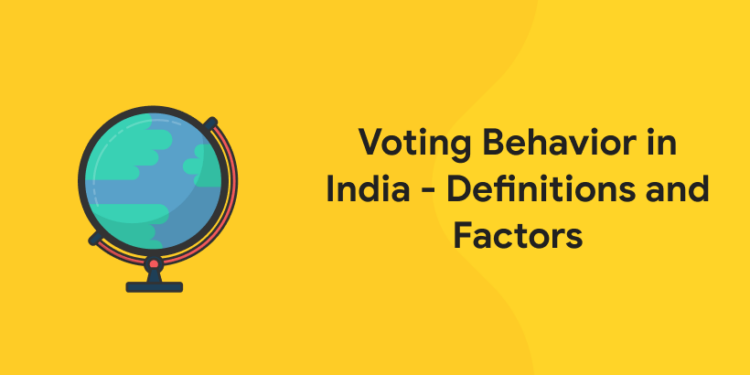Table of Contents
Voting behavior is a form of electoral behavior. It is essential to understand the voters’ behavior to explain how and why decisions were made either by public decision-makers or by the electorate. It helps political psychologists understand why certain people vote for different political parties so that political parties can predict who might vote for them in the future, which will in turn help them to plan the policies, communication and the people who might best represent them and persuade voters to vote for them at the next election. The behavior of voters can be traced to the benefits or disadvantages to their quality of life that they perceive would be a consequence thereof.
Attempt Free Current Affairs Tests! Register Here!
Both political science and psychology expertise are imperative to understand the voting behavior. Political psychology researchers study ways in which affective influence may help voters make more informed voting choices. Bruter and Harrison suggest that electoral psychology encompasses the ways in which personality, memory, emotions, and other psychological factors affect citizens’ electoral experience and behavior.
Definition of Voting Behavior
Voting behavior refers to the actions or inactions of citizens in respect of participating in the elections that take place for members of their government at different levels. Samuel S. Eldersveld, in his article Theory an Method in Voting Behavior Research, writes: “The term voting behavior is not new. But it has been used of late to describe certain areas of study and types of political phenomena which previously had either not been conceived or were considered irrelevant.” Voting behavior is not confined to the examination of voting statistics, records and computation of electoral shifts and swings.
The study of voting behavior can be roughly divided into long-term and short-term influences. Long-term influences include social class, gender, race, culture, religion, age, education, housing tenure and simple long-term political alignment. Long-term shifts result from alterations in basic loyalties and represent changes that last beyond a particular election. It can occur when there is a critical realignment of the party system, which refers to a relatively rapid, fundamental, and durable alteration in the pattern of party loyalties held by the electorate. Short-term influence include the performance of the governing party, major issues, the electoral campaign, the image of party leaders, the influence of the mass media and major political events. Short-run changes are the result of fluctuations in factors that are specific to an election, such as the characteristics of the candidates or the condition of the economy.
The various factors that influence the vote decision vary in their stability over time. Most voters do not change their ideology or party identification from one election to the other. This mostly remains stable. Evaluations of candidate qualities and government performance can be short term forces.
Attempt Free Current Affairs Tests! Register Here!
Factors that Affect Voting Behavior
There are several other factors that affect the voting behavior – social influence, peer effects, beliefs, language, knowledge structure, wealth and region in which a voter lives etc. are some of them. Surveys from different countries indicate that people are generally happier in individualistic cultures where they have rights such as the right to vote. Let us have a look at some of the factors that affect the voter behavior in our country.
Ideology – It is a major factor because, every political party has formed by some foundation principles, enlisted as right wing, left wing and central parties.
Religion – It is often a factor which influences one’s party choice. Even though India is a secular state, religion has crept into politics and parties have been formed on the basis of religion, for example, Muslim League, Akali Dal, Hindu Maha Sabha, Shiv sena etc. The selection of candidates is done with an eye upon the presence of a religious majority in a particular constituency. The candidates seek votes by playing the
religious card with co-religious voters and the secular card with members of others religious communities. .The voters very often vote on
religious considerations
Caste – Even though it is against the principle of constitution, caste is another major factor affecting the voting behavior. Political parties try to lure people by exploring caste identity. Caste system has deep roots in the society and constitutes an important basis of social relations at all levels. The political parties in India, without any exception, while formulating their policies, programs and election strategies always keep in mind the caste factor. However this is undergoing changes in the urban areas. Issue based political struggle is gradually taking its shape in the Indian polity.
Language – Linguism also acts as factor in voting behavior. Most of the states are divided on the basis of language. There have been problems in states like that of status of one particular language in that state, or relating to the quality of the status of a language of a state. Since people have emotional attachment with their languages, they easily get influenced whenever there comes up any issue relating to language.
Wealth – Money plays a vital role in determining voting behavior of the people in India. A rich candidate or party always has a better chance of winning the elections.
Literacy – The literacy rate among the people of the country is low and this plays a major role in the voting behavior. The illiterates are exploited in the name of caste, religion, region and other such factors. The votes of the illiterate constitute a big proportion of the votes polled and hence it plays a big role in determining the outcomes of elections.
Performance of the party in power – Political parties are expected to fulfil the promises made by them in the election manifesto. The performance of the party depends on it’s ability to work on the manifesto and implement their promises by putting it into action. The ability to do this influences the basic behavior of the people in a big way.
Individuals use different criteria when they vote, based on the type of election. Therefore, voting behavior is also conditional to the election which is held. For example, religion may play a larger role in a national election than in regional one, or vice versa.
Attempt Free Current Affairs Tests! Register Here!
The various attitudes and orientations that influence voting behavior are interrelated. Understanding the interrelationships among these factors is important for a full understanding of voting behavior. The political parties and groups make use of these variables for the sake of winning the battle of the ballot box. Mere presence of an electoral system does not make a political system democratic. The will of people is expressed through voting in elections and therefore it is imperative that the use of these determinants should be avoided and elections should be conducted in a very free and fair manner.
The key point to clear an exam lies in methodical and planned preparation. If you are a candidate who wants to pursue your dream career and looking for a good start, Entri App has got it covered for you. Entri App provides a great online platform for all those aspiring to appear for various bank exams, government exams and other competitive exams. Our team of experts provide short and precise video classes which helps in learning the concepts. Users get access to flash cards and quizzes and can attempt unlimited mock exams with the same pattern as that of the real exams. We also provide PDFs of previous years’ question papers with solutions.













